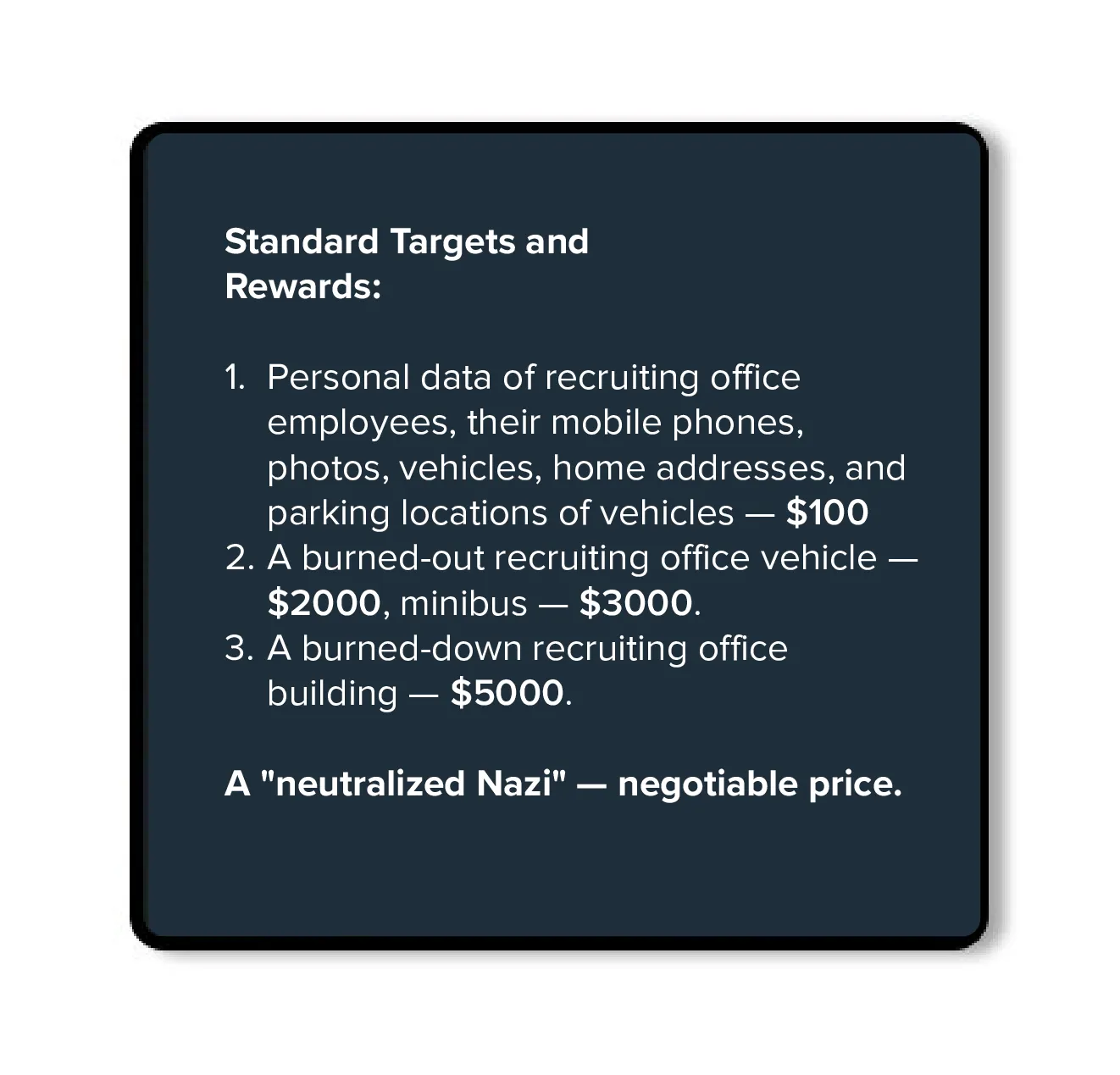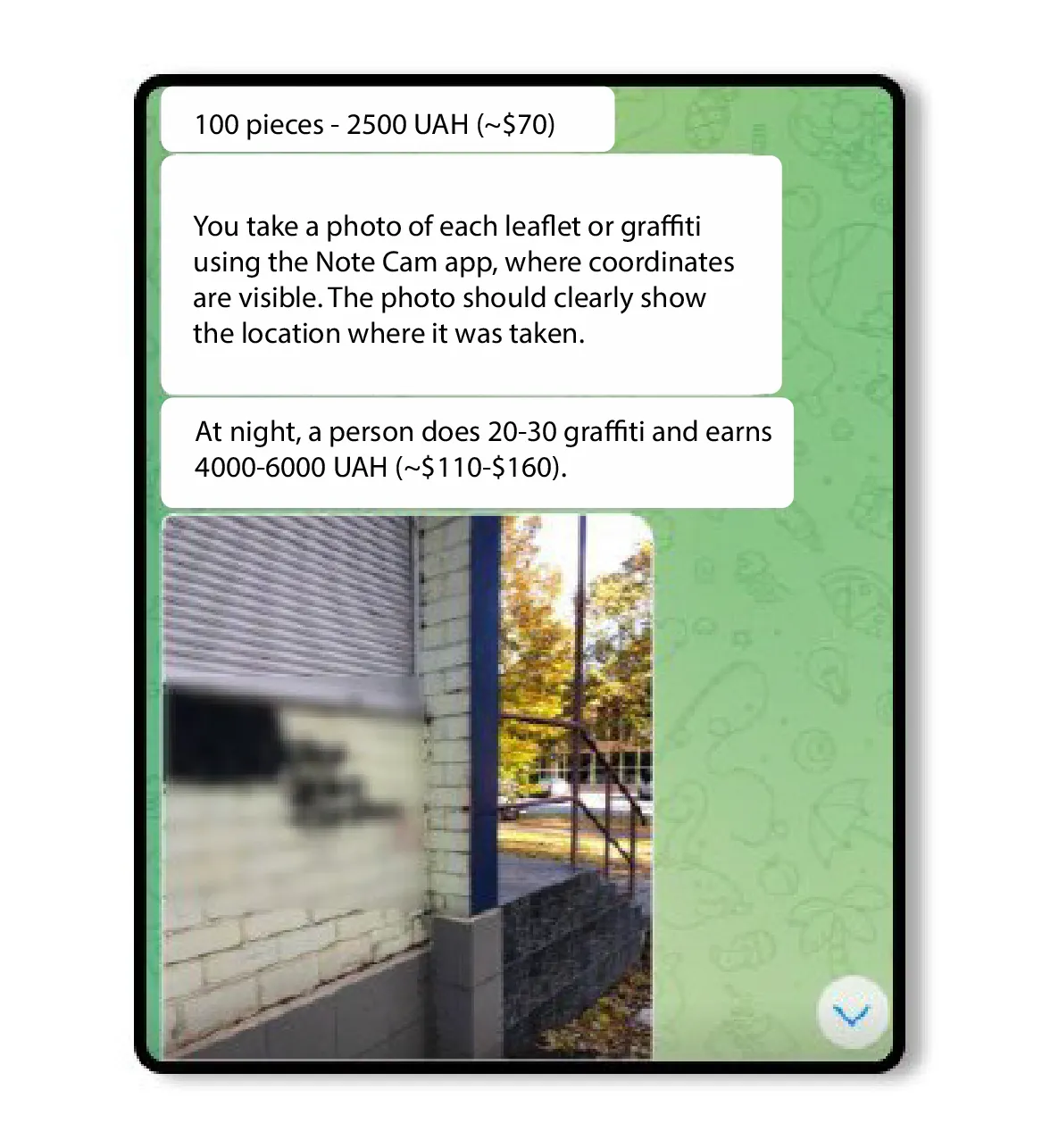Russian intelligence recruits young Ukrainians to disrupt mobilization
Almost every day in Ukraine, terrorist attacks take place, explosions occur near and inside the buildings of the recruiting office, and military vehicles burn. The public debate continues as to whether the perpetrators of these attacks are marginalized people offended by the government, convinced ideological supporters of the "Russian world," or simply seekers of easy money offered by Russian special services.
Texty.org.ua journalists, pretended to be potential "terrorists" talked to "recruiters" of Russian intelligence, who are looking for people to burn buildings and vehicles of recruiting office in Ukraine, that is a part of mobilization campaign.
Graffiti on the wall
This whole story started in a semi-dark underground pedestrian crossing in one of the capital's residential areas. An acquaintance of one of the article's authors accidentally saw rather strange graffiti on the wall with the address of an unknown Telegram channel. Obviously, he was a rather curious person, so he decided to go to this address.
Further events developed as if in a detective novel. At first glance, the link seemed to be a simple clone of typical Russian propaganda resources about the work of the Recruiting office. Everything was in line with the propaganda narratives: a video of another mobilized man being captured in the car, desperate comments from his family, and angry posts by the resource administrator, who once again asked how long this could go on.
Territorial Center of Recruitment and Social Support (or simply Recruiting office) — is Ukraine's military administration body that keeps military records and mobilizes the population.
The price of sabotage
We were gradually, but very insistently, led to the need for real violence against representatives of the Recruiting office and the Ukrainian authorities in general. These included posts about propaganda leaflets posted by "resistance members" and the attribution of authorship to the terrorist attack on the Recruiting office building in Rivne and the murder of a soldier in the Poltava region. Then, an announcement with numbers suddenly appeared in the posts.
Then, there was a straightforward text: a list of sabotage and terror actions, primarily against the Recruiting office employees, with specific prices for their commission — a kind of price list for terrorists.

All this was so straightforward and open that, until a certain point, we still couldn't help but wonder if this was a setup by Ukrainian intelligence, which was trying to catch potential collaborators "alive." So, we decided to talk to the administrator of the Telegram channel to find out more.
Support TEXTY.org.ua
TEXTY.ORG.UA is an independent media without intrusive ads and puff pieces. We need your support to continue our work.
Almost network marketing
At this point, it became clear that we were talking to real Russian recruiters. What immediately caught my eye was the extremely good workmanship of the resource. First, we were asked to answer a questionnaire.

After we answered the questions, the Russian intelligence's HR conducted an additional small online interview with us: what would you like to do? What skills do you have?
Thus, our interviewer began actively asking us whether we had any skills in working with drones or access to drones or their parts. It seems that this topic was really of great interest to Russians. Unfortunately, we were unable to find out what exactly they needed the drones for. As if sensing our interest, they said, "Let's work on simpler "projects first, so to speak, to get the hang of it, and then move on to something more serious."
The simpler projects involved visual campaigning. For example, we were asked to make our own stencils with the Telegram channel's advertisement and place them prominently.

The scheme for recruiting a new "employee" is not much different from standard network marketing practices. If you work well, you get more. And, of course, some career growth is possible.

Thus, the Russian special services raise a talented agent step by step - from a petty saboteur who posts ads or makes stencils to a terrorist who can be entrusted with committing truly bloody terrorist attacks in the future.
Interestingly, the actions of law enforcement agencies to find the car arsonists have yielded results. Because now Russian handlers advise to puncture the tires or immediately proceed to attempted murder.

Money and more money
Then we discovered a whole network of similar Telegram channels, which had one main Telegram channel with about 5,000 users and a bunch of regional channels created for virtually every regional center (like Kyiv or Lviv), with users ranging from several hundred to almost a thousand each. The total number of participants seems not that large, but it's quite enough for the purpose for which they were actually created.
The communication and involvement scheme is identical to the one we saw on the first channel: offers of sabotage, terror, and, of course, prices.
At the same time, not a single word was said about the "Russian world" or anything like that. On the contrary, in a private conversation, the administrator began to assert that he was also from Ukraine and that the Russians had nothing to do with this resource.
"I'm doing this for my children so they can live in a normal country," he wrote. However, he forgot to specify where the money came from. It's the money that is driving this whole process. It seems that it is no longer a secret to anyone on the other side that the only real condition that holds up the tinfoil edifice of modern Russia and the "Russian world" is the cash flow. If it runs out, everything else will come to an end.
But there is a certain unpleasant truth in this for us as well. Judging by the statements of law enforcement agencies, we also have no shortage of people who want to get "blood money." And we are talking not only about drug addicts or retired Soviet pensioners but also about ordinary Ukrainian youth and even schoolchildren.
And again, the Telegram.
Young people are one of the main recipients of such terrorist resources. It is no coincidence that the Russian intelligence supervisor asked about their age at the beginning of the conversation. And he was only in favor when he was offered the help of 15-17-year-olds.

Of course, the younger a person is, the fewer questions they will ask and the more chances they have of being dragged into something bad.
Read more: Eight signs of the danger of Telegram, one of Russia's most successful projects
And one more thing: it has always been the case, and it will continue to be the case, that Russians recruit almost all of their agents via Telegram. It seems that it has been said and done that this social network is insecure. However, the authorities have done nothing to block it in Ukraine, although it is technically possible. So there is only one thing we can be sure of: even if we manage to block a single channel, a network of new ones will appear in its place tomorrow. And the conveyor belt of sabotage, arson, and merging of vital facilities will continue in Ukraine.
All information obtained during the writing of this article will be passed on to law enforcement agencies.

